



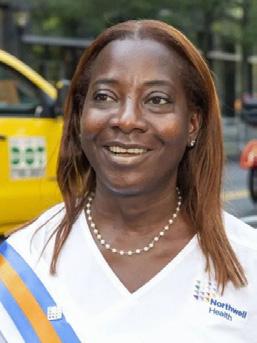







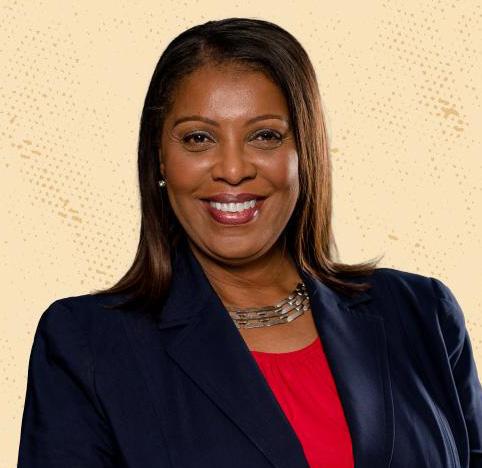
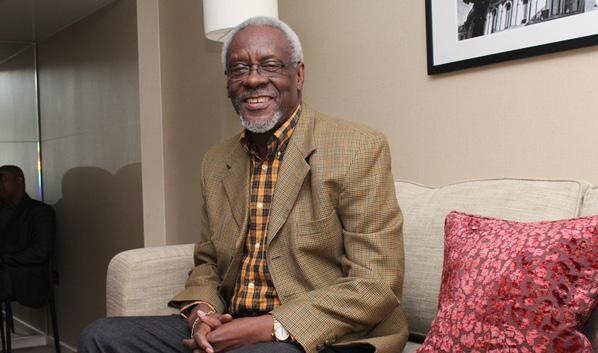
















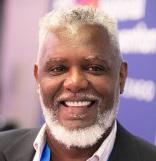


Africa and the Caribbean—From Shared History to Shared Destiny - P 10
OPED
Trustees Warn of Looming Cuts to Social Security, Medicare as Trust Funds Dwindle by Stacy M. Brown - P 10
CCCADI Debuts Second Location as East 125th Street Becomes NYC’s Newest Business Improvement District - P 14
Thompson Impresses at Jamaican Championships - P 20

Funding shortages threaten relief for millions of Sudanese refugees: WFP
In an alert, the UN agency warned that it faces having to make “drastic cuts” to life-saving food assistance, which may “grind to a halt” in the Central African Republic, Egypt, Ethiopia and Libya in the coming months as resources run out.
WFP noted that the situation for many Sudanese refugees is already dire, more than two years since war erupted between Sudan’s national army and paramilitary rebels.
“In Uganda, many vulnerable refugees are surviving on less than 500 calories a day” – less than a quarter of daily nutritional needs – as new arrivals strain refugee support systems, WFP said.
In Chad, which hosts almost a quarter of the four million refugees who fled Sudan, food rations will be reduced in the coming months without new contributions.
Children are particularly vulnerable to sustained periods of hunger and malnutrition rates among young refugees in reception centers in Uganda and South Sudan have already breached emergency thresholds.
According to WFP, refugees are already severely malnourished even before arriving in neighboring countries to receive emergency assistance.
“This is a full-blown regional crisis that’s playing out in countries that already have extreme levels of food insecurity and high levels of conflict,” said Shaun Hughes, WFP Emergency Coordinator for the Sudan Regional Crisis.
DR Congo: New initiative to eliminate HIV in children ‘a beacon of hope’
“Our country can no longer tolerate children being born and growing up with HIV, when tools exist to prevent, detect and effectively treat this infection,” President Félix Tshisekedi declared at a recent government conference in the south-eastern Lualaba province, as he launched the five-year initiative.
Backed by an initial commitment of $18 million in national funds, the Presidential Initiative to End Pediatric AIDS will focus on political leadership, systems strengthening and inclusive healthcare access particularly for children, adolescents, and pregnant women.
It also aligns well with DRC’s global commitments under the Sustainable Development Goal 3 (SDG 3) to ensure healthy lives and promote well-being for all.
The initiative marks a renewed commitment by the DRC to address children’s extremely limited access to HIV prevention and treatment services.
While the DRC has made notable strides in adult HIV response – 91 percent of adults living with HIV now have access to antiretroviral treatment – children continue to lag far behind.
Only 44 percent of children living with HIV in the country currently receive lifesaving treatment, a figure that has remained unchanged for over a decade.
Every year, thousands of Congolese children are still infected, often due to a lack of screening among pregnant women...
Afghanistan: Surging returns from Iran overwhelm fragile support systems, UN agencies warn
Ninety-nine per cent of the returnees were undocumented, and 70 per cent were forcibly returned, with a steep rise in families being deported – a shift from earlier months, when most returnees were single young men, according to the UN agency.
The rise follows a March decision by the Iranian Government requiring all undocumented Afghans to leave the country. Conditions deteriorated further after the recent 12-day conflict between Iran and Israel, which caused the daily refugees crossings to skyrocket from about 5,000 to nearly 30,000, according to Arafat Jamal, the UN refugee agency (UNHCR) representative in Afghanistan.
“They are coming in buses and sometimes five buses arrive at one time with families and others and the people are let out of the bus and they are simply bewildered, disoriented, and tired and hungry as well,” he told UN News, describing the scene at a border crossing.
“This has been exacerbated by the war, but I must say it has been part of an underlying trend that we have seen of returns from Iran, some of which are voluntary, but a large portion were also deportations.”
Afghanistan, already grappling with economic collapse and chronic humanitarian crisis, is unprepared to absorb such large-scale returns.
Gaza: UN urges Israel to allow fuel into Strip
“Amid ongoing Israeli military operations, scores of people have reportedly been killed and injured, including while waiting for food,” the UN Office for the Coordination of Humanitarian Affairs (OCHA) said.
“Over the weekend, there were numerous reports of attacks hitting homes, as well as schools hosting displaced people,” it added.
OCHA noted that amid the “heavy constraints” on bringing in supplies and carrying out humanitarian operations across Gaza, people are going hungry.
“The World Food Programme (WFP) reports that one in five people faces catastrophic hunger, and more than 90,000 women and children urgently require treatment for malnutrition,” it said.
WFP has about 130,000 metric tons of food positioned in the region, ready to serve people in Gaza if improved access is granted.
OCHA reiterated calls on Israel to facilitate the access and entry of essential supplies into Gaza, through the available crossing points and corridors, to address people’s desperate needs. Fuel, in particular, is urgently needed.
“The UN and its partners call on the Israeli authorities, with utmost urgency, to allow the entry of fuel into Gaza. This is critically needed for life-saving operations...

the regions to unite in what he described as “Global Africa’s” journey toward shared prosperity and global influence.
Delivering the keynote address at the 32nd Annual Meeting of the African Export-Import Bank (Afreximbank), Patterson addressed an audience that included African heads of state, Caribbean leaders, and international development partners. His message was clear: the time has come
to convert centuries of shared history into a powerful, modern economic bloc.
“We are now separated by the Atlantic Ocean, but we should never forget that in the age of Gondwana, we were all part of a single supercontinent,” Patterson said, invoking the geological history that once physically connected Africa and the Caribbean. “That geological rupture gave us both the richly endowed continent of Africa and the bejeweled fragments that are the Caribbean Islands.”
Patterson stressed the urgency of deepening Africa-Caribbean cooperation, particularly in the face of rising global protectionism and shifting international power dynamics. Current trade between the regions stands at approximately US$729 million, but projections by the International Trade Centre and Afreximbank suggest this figure could grow to US$1.8 billion by 2028 through strategic investment and collaboration.
“The global order that has existed since the Second World War is imploding before our eyes,” Patterson warned. “Protectionist forces are increasingly intolerant of the aspirations of the Global South. For our survival and prosperity, we must act with urgency to strengthen our regional ties.”
The former prime minister applauded Afreximbank’s Caribbean Initiative, which has already committed US$2.5 billion
in project pipelines and US$1.5 billion in investment opportunities across both regions. He also commended the establishment of the African Trade Centre in Bridgetown, Barbados, as a tangible sign of growing partnership.
Patterson highlighted the transformative role of artificial intelligence (AI) and digital innovation in bridging the Atlantic divide, announcing a joint pilot project between Afreximbank and the University of the West Indies’ Institute for Africa-Caribbean Advocacy to develop an AI hub that will drive collaboration in education, research, trade, and innovation.
“We who belong to Global Africa must develop AI of our own to deepen our economic and cultural linkages,” Patterson said. “Our regions are leaders in creative and cultural industries. AI can create the digital infrastructure that transforms innovation and creativity into tangible economic value.”
Drawing on his extensive diplomatic career, including his role in shaping the Lomé Convention and his time as President of the UN Security Council, Patterson called for unified Africa-Caribbean positions in major international forums.
“We must not allow ourselves to be divided or disregarded at the WTO, in the IMF, at the United Nations, or especially during climate negotiations,” he urged. “We must
develop a common diplomatic architecture, coordinate our messaging, and resist efforts to dilute our agendas.”
For Patterson, the path to economic transformation is inseparable from cultural pride and historical consciousness.
“Our economic emancipation cannot be defined by metrics alone,” he said. “It must be rooted in a profound recognition of who we are. Our youth must know they are the descendants of astronomers, engineers, architects, and philosophers. Before the Age of Exploration, there was the Age of the Nile Valley, of Timbuktu, of Kumasi, and of the Maroons. We are creators of knowledge.”
He concluded with a stirring call to action that resonated throughout the conference: “When our ancestors were taken across the Middle Passage, they carried not only pain but also purpose. Today, we are that harvest. We are the realization of their longing. Let us turn this initiative into a movement, and this movement into unstoppable momentum—one of unity, prosperity, and pride.”
The next major milestone in advancing Africa-Caribbean collaboration will be the AfriCaribbean Trade and Investment Forum, scheduled for July 28-29, 2025, in St. George’s, Grenada.
A Caribbean delegation is preparing to travel to Europe next month to reignite international discussions on reparations for slavery and colonialism, organizers have confirmed to reporters. The high-stakes trip will see representatives from the region making stops in Brussels and London to push for formal engagement on one of the most contentious historical issues still shaping global inequalities today.
Between the 15th and 19th centuries, more than 12.5 million Africans were kidnapped, trafficked across the Atlantic by European ships, and sold into slavery—a legacy that Caribbean leaders say continues to fuel systemic racism and economic disparities in the region.
Calls for reparations have gained significant traction in recent years, particularly among Caribbean Community (CARICOM) member states and the African Union (AU). However, the movement has also faced stiff resistance, with many European leaders rejecting discussions on financial or structural reparations.
The upcoming mission is being organized by The Repair Campaign, an advocacy
group committed to advancing reparations within the Caribbean. The delegation will begin its tour in Brussels on July 1, where members will host a formal briefing with European Union lawmakers. Although the EU in 2023 acknowledged that Europe inflicted “untold suffering” on millions during the transatlantic slave trade, no European nation has yet agreed to reparative measures.
On July 2, the delegation will move to London for a parliamentary briefing aimed at opening direct dialogue with British officials. Britain, which transported an estimated 3.2 million Africans—the largest number among European countries after Portugal—has consistently rejected calls for reparations, despite growing public pressure.
Organizers say the delegation’s goal is not to demand immediate payment but to establish sustained diplomatic engagement and to push for European governments to play an active role in reparative justice. The delegation includes Caribbean scholars, policy experts, and members of national reparations committees backed

by CARICOM governments. CARICOM’s reparations plan advocates for a 10-point program that includes technology transfers, financial investments, debt cancellation, and initiatives to address chronic health crises and educational gaps linked to the legacy of slavery and colonial exploitation. The African Union is also developing a complementary reparations framework.
Opponents of reparations argue that present-day nations should not be held
accountable for historical atrocities committed by their predecessors. However, supporters contend that reparative action is necessary to address the enduring impacts of slavery, including institutional racism, underdevelopment, and global economic inequality.
The upcoming meetings in Europe mark a significant step in what Caribbean leaders have described as a long, necessary journey toward historical accountability and restorative justice.
Georgetown, Guyana — President Irfaan Ali has reaffirmed Guyana’s deep commitment to its strategic partnership with the United States, stressing that the relationship is critical to Guyana’s national development and must not be placed at risk.
President Ali emphasized the critical importance of the U.S.-Guyana partnership, particularly following last month’s high-level visit by U.S. Secretary of State Marco Rubio.
“We value this strategic partnership and welcome the continued U.S. commitment to our bilateral cooperation,” Ali told the gathering. “The work we’ve done over these five years - we must do nothing to risk these hard-earned partnerships.”
His remarks underscored Guyana’s careful stewardship of the relationship, coming at a time when the South American nation is emerging as an energy powerhouse and
key U.S. ally in the region.
Ambassador Theriot highlighted unprecedented military and law enforcement collaboration, noting:
Enhanced coastal defense through joint development of radar capabilities with Guyana Defense Force.
Expanded training programs involving NYPD, FBI and DEA working with Guyanese counterparts.
Knowledge exchanges strengthening institutions like CANU and SOCU
“Our military-to-military partnership is the strongest it’s ever been,” Theriot declared, pointing to recent acquisitions and exercises that have bolstered Guyana’s security infrastructure.
The evening’s speeches revealed the multifaceted nature of U.S.-Guyana cooperation:
- Economic: With Guyana’s oil boom

creating new opportunities
- Security: Addressing regional stability concerns
- Diplomatic: Maintaining Guyana’s democratic trajectory
President Ali’s appearance at the high-profile event signals Georgetown’s commitment to maintaining strong ties with Washington even as global geopolitics grow increasingly complex.
“When Secretary Rubio visited last month, it reaffirmed our shared vision,” Ali noted, suggesting more high-level engagements may follow.
As Guyana assumes greater regional importance, its relationship with the U.S. serves as:
A counterbalance to external influences
An anchor for democratic governance
An engine for sustainable development
The warm reception atmosphere, filled with Guyanese and American officials, reflected what both leaders described as a partnership “built on mutual respect and shared values.”

The Integrity Commission’s latest annual report has exposed deepening concerns about corruption in Jamaican politics, revealing that 13 Members of Parliament and one Senator now face investigations for alleged illicit enrichment or providing false declarations since 2018. The report, tabled in the Senate last Friday, comes amid heightened political tensions ahead of general elections expected by September.
Key Findings from 2024-2025 Report: Two new parliamentarians referred for illicit enrichment probes under the Corruption Prevention Act Six cases against lawmakers closed over seven years, with only one resulting in recommended charges 55 additional public officials investigated, including 7 councilors and 7 heads of government entities.
Controversial handling of PM Andrew Holness’ 2021 income filings remains unresolved
The report fuels ongoing debates about accountability, particularly after last year’s high-profile non-conclusion regarding Prime Minister Holness’ asset declarations.
While Holness maintains his innocence and has challenged the Integrity Commission in court, opposition lawmakers accuse the government of “delaying tactics” in tabling the report.
Under Jamaican law, public servants can face prosecution if: Their assets disproportionately exceed lawful income
They fail to provide satisfactory explanations when questioned
Defenders of the system argue the Commission’s secrecy provisions prevent trial by media, while critics demand faster resolutions and public transparency. With elections approaching, these cases may become central to voter trust in Jamaica’s governance, especially with facts as they are–36 “other public officials” under scrutiny, only 2 councillors and 1 entity head recommended for charges since 2018, and there are growing calls for anti-corruption reforms amid perceived low conviction rates
The Commission maintains it operates within legal constraints, but as political temperatures rise, so too does public skepticism about whether Jamaica’s accountability systems can effectively combat corruption at the highest levels.


In a bold move to enhance officer safety and modernize firearms administration, Police Commissioner Allister Guevarro unveiled a series of transformative policy changes that will fundamentally alter how Trinidad and Tobago’s law enforcement personnel and civilians interact with firearms
The most significant reform will allow frontline tactical and operational officers to retain their service weapons while off-duty, marking a dramatic departure from previous protocols that required firearms to be surrendered after shifts.
Commissioner Guevarro emphasized this change during a television appearance,
stating emphatically, “My officers won’t sign off their guns again after confronting criminals.” This policy shift comes following a comprehensive audit of the TTPS armory to assess available serviceable pistols and is specifically designed to protect officers who may be targeted due to their law enforcement roles.
Simultaneously, the Commissioner addressed the massive backlog of 55,000 pending firearm license applications by implementing a strict six-month validity window for all supporting documents.
The Firearm Permit Section has been instructed to return incomplete or outdated applications to divisional offices for updates before final review. “We must ensure all documentation, from medical certificates to psychometric evaluations, reflects current circumstances,” Guevarro explained, noting that certificates of good character expire after six months under existing regulations.
The reforms extend to less-lethal options as well, with the TTPS having already issued 225 pepper spray permits and approximately 800 applications still being processed. Looking ahead, the service plans to introduce sophisticated new
identification cards featuring scannable security features for both firearm and pepper spray permits, significantly upgrading from current identification methods.
These sweeping changes arrive amid ongoing concerns about officer safety in Trinidad and Tobago, where 26 police officers have been killed in the past decade. While law enforcement unions have welcomed the measures as long overdue protections for their members, some community advocates have raised questions about potential impacts on police accountability and whether increased firearms circulation might inadvertently escalate violence.
As the TTPS moves forward with implementing these policies, all eyes will be on how these changes affect both officer safety and public security in the coming months. The firearm retention policy will take effect following completion of armory audits, while thousands of license applicants await notifications about their pending requests. Meanwhile, development continues on the next-generation permit cards designed to combat forgery and improve tracking of legally authorized weapons.
Shannon Lee Samlalsingh (46, Tampa) has pleaded guilty to conspiracy to making false statements to a firearms dealer on June 20, 2025. Samlalsingh faces a maximum penalty of five years in federal prison. A sentencing date has not yet been set.
According to the plea agreement, in 2020 and 2021, Samlalsingh purchased several firearms and firearms components from federally licensed firearms dealers in Hillsborough County and Miami-Dade County where she falsely stated on ATF 4473 forms that she was the actual transferee or buyer of said firearms. In reality, Samlalsingh had received money via international wire transfers from members of a Trinidadian transnational criminal organization with instructions to purchase specific model firearms and firearms components, then transfer them to other members of the transnational criminal organization already in Florida, to smuggle them back to Trinidad. Samlalsingh kept a percentage of the wire transfer funds as compensation. The firearms were smuggled back to Trinidad and Tobago by concealing them in a large wireless speaker and punching bags.
On or about April 21, 2021, authorities at the Piarco International Airport in Trin-
idad and Tobago seized a shipment from the United States containing two punching bags and other goods. Concealed within the two punching bags were approximately eleven 9mm pistols, two .38 caliber special revolvers, a 12-gauge semi-automatic shotgun, three AR-15 barrel foregrips, 19 lower pistol grip assemblies, 11 forearm bolt assemblies, three AR-15-style barrels with forearm grips, 32 AR-15 magazines, one AR-15 drum magazine, 470 rounds of AR-15 ammunition, 34 9mm magazines, three 9mm drum magazines, 284 9mm rounds, fifteen .38 caliber rounds, 36 shells, six magazine couplers, and two shotgun chokes. Specifically, Samlalsingh purchased a SAR-9 9mm pistol, a Ruger-9 9mm pistol, a Taurus G3 9mm pistol, a Taurus G2C 9mm pistol which were all traced to the April 21, 2021, seizure in Trinidad and Tobago.
This case was investigated by Homeland Security Investigations and the Bureau of Alcohol, Tobacco, Firearms and Explosives, with assistance from the Trinidad and Tobago Ministry of National Security (Transnational Organized Crime Unit) and Trinidad and Tobago Police Service (Special Investigations Unit), U.S. Citizenship and Immigration Services, the Florida Department of Law Enforcement,

U.S. Customs and Border Protection and the Justice Department’s Office of International Affairs. It is being prosecuted by
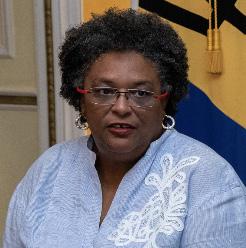
Prime Minister Mia Amor Mottley has firmly rejected claims that Barbados’ recent minimum wage increase will automatically trigger higher food prices.
Addressing the House of Assembly on Monday during debate on the Report of the Parliamentary Reform Commission, Mottley called such arguments misleading and emphasized the need for businesses to act in the national interest.
The Prime Minister was responding to concerns raised by businessman Andrew
Bynoe, managing director of A1 Supermarkets, who had warned in the SUNDAY SUN that the minimum wage adjustment, effective June 1, would leave businesses with no choice but to pass on the increased labour costs to consumers.
Mottley dismissed the claim, pointing out that businesses had previously benefited from significant tax cuts but had not lowered their prices.
“I completely reject the assertions of the owner who has indicated that food prices must go up purely because there’s a minimum wage in this country,” she said.
“May I remind him that his prices did not go down when this Government reduced corporation taxes from 25 percent to 5.5 percent in 2019.”
She argued that profit margins could be adjusted modestly in difficult times.
“If my mark-up and my return were 25 percent before and my profits were at 15 or 12 percent, then I can do with 11 or 10 percent—largely because we must carry everybody with us in these turbulent times.”
Mottley also reminded the House of mea-

In a significant diplomatic outreach to the Global South, Prime Minister Narendra Modi will embark on an eight-day, five-nation tour beginning July 2 – his longest foreign visit in a decade. The tour, spanning Africa and Latin America, will include historic parliamentary addresses in Ghana, Namibia, and Trinidad & Tobago, along with participation in the BRICS Summit in Brazil.
The Trinidad & Tobago leg marks Modi’s first visit as Prime Minister and the first bilateral
visit by any Indian PM since 1999. “This visit comes at an opportune time as Trinidad & Tobago commemorates 180 years of Indian immigration this year,” said MEA spokesperson Malhotra, noting the shared history forms “the bedrock of our close and enduring people-to-people ties.”
In a special gesture, Modi will address a joint session of Trinidad & Tobago’s Parliament – a move Malhotra called “symbolic of our strong parliamentary traditions and democratic values.” She highlighted that India had gifted the Speaker’s chair in their Parliament, calling it “a symbolic reminder of our democratic bonds.”
The significance of this visit includes a bid to reinforce diaspora ties, to strengthen partnerships with key developing nations, and democratic diplomacy.
“This visit will reaffirm our enduring ties with the Caribbean while expanding strategic partnerships across the Global South,” Malhotra emphasized, noting delegation-level talks will review and deepen bilateral relations.
The tour represents India’s most ambitious diplomatic engagement with the Caribbean and Africa in recent years, blending historical ties with contemporary strategic interests.
sures already implemented by her administration to cushion cost-of-living pressures, including the absorption of freight costs since December 2019 to buffer both businesses and consumers from external economic shocks.
“This Government did not sit idly by. We moved to protect Barbadians and the business community when the pandemic threatened to unravel supply chains. So, I do not accept that a rise in the minimum wage must mean more expensive food,” she said.
Her remarks were part of a wider presentation reflecting on Barbados’ democratic journey since the introduction of universal adult suffrage 75 years ago. Mottley underscored that transformative national policies—such as free education, land redistribution, unemployment benefits, and the establishment of a minimum wage— were made possible because Barbadians secured the right to vote in 1950.
“These were not acts of chance,” Mottley emphasized. “They were deliberate choices made possible by the vote and rooted in the principle that every Barbadian de-
serves the opportunity to rise.”
The Prime Minister also addressed the importance of continuous democratic evolution, especially in light of Barbados’ new republican status. She praised the extensive public engagement conducted by the Parliamentary Reform Commission, which included ten national town halls, diaspora consultations via Zoom, and expert academic input.
“Governance must be ventilated openly, and the public must always be invited into the room,” she said. “Democracy is not something that happens every five years when we vote. It is a living, ongoing conversation between the Government and the people.”
While Cabinet has yet to take a formal position on the Commission’s recommendations, Mottley said she looks forward to a national debate that will further strengthen Barbados’ democratic system, ensuring it reflects inclusivity and transparency. She closed with a call for national unity and shared sacrifice as essential pillars for navigating the global uncertainties ahead.


In a significant reversal of Biden-era policies, President Donald Trump signed a National Security Presidential Memorandum (NSPM) on June 30, reinstating and expanding restrictive measures against Cuba’s communist regime. The move marks a return to the hardline approach of Trump’s first term, with new provisions aimed at cutting financial lifelines to Cuba’s military while increasing pressure for democratic reforms.
Key Provisions of the New Cuba Policy
1. Economic Restrictions Reinstated
Bans transactions with Cuban military-controlled entities (including GAESA conglomerate)
Enforces U.S. tourism ban with strict auditing of travel-related transactions
Maintains embargo support, opposing UN efforts to lift sanctions
2. Human Rights & Accountability Measures
Mandates review of Cuban human rights abuses, including political detentions
Requires report on fugitives from U.S. justice harbored in Cuba
Expands support for independent Cuban media, private enterprise, and internet freedom
3. Migration Policy
Keeps “Wet Foot, Dry Foot” policy terminated to deter dangerous migration
Includes Cuba in new travel ban due to:
• Designation as state sponsor of terrorism
• Non-cooperation on law enforcement
• High visa overstay rates
The NSPM reverses Biden administration policies that had eased some restrictions, arguing they “disproportionately benefited” Cuba’s military and security apparatus rather than its people. Trump’s policy instead emphasizes: “As president, I will again stand with the people of Cuba in their long quest for justice, liberty and freedom.” These measures comes amid renewed crackdowns on Cuban protesters and journalists, and follows recent reports of Cuban officials harboring fugitives. It also aligns with broader Trump administration foreign policy shifts. The State Department will implement the measures immediately, with first reports on Cuban human rights abuses and harbored fugitives due within 90 days.

The call has been made—and we at Carib News answer it with full-throated agreement. Former Jamaican Prime Minister P.J. Patterson, statesman and visionary, has sounded the alarm and lit the torch: it is time—past time—for Africa and the Caribbean to unite in an economic revolution that matches the magnitude of our shared legacy.
For centuries, we have been told that the ocean between us is a divide. Patterson, however, reminds us that it is a bridge— one we must now cross not with nostalgia, but with purpose. We share bloodlines, battles, brilliance—and now, we must share strategy.
Let’s be frank: global economic systems are shifting, and not in our favor. The postwar world order that once promised trade and prosperity is fracturing under the weight of protectionism and geopolitical power plays. The Global South has often been treated as an afterthought in these arrangements—but together, Africa and the Caribbean can refuse to be sidelined. The question is not whether we can act,
but whether we will act fast enough. Trade between Africa and the Caribbean remains frustratingly low—yet the potential is enormous. With better infrastructure, harmonized regulations, and proactive investment, we can multiply that volume several times over within just a few years. This isn’t wishful thinking— it’s economic common sense. But good intentions aren’t enough. We need targeted action: direct shipping lines, shared ports, open skies, preferential trade terms, and streamlined customs protocols. Beyond trade, there is the digital frontier. Patterson was right to insist that we cannot simply consume artificial intelligence designed elsewhere. We must create our own tools—AI systems rooted in our languages, cultures, and needs. Technology must not be another form of dependency, but a lever for self-determined growth. Imagine an AI model that supports our schools, amplifies our music, teaches our history, translates our dialects, optimizes our agriculture, and fuels our innovation. That’s not fantasy—it’s a necessity.
But none of this matters without cultural self-awareness. Patterson challenged us to educate our youth not as products of slavery, but as descendants of architects, astronomers, engineers, poets, and freedom fighters. Our economic path must run through our cultural core. Without pride, there can be no purpose. And without purpose, no progress. We need an intellectual and spiritual revolution to match the economic one. If our children do not see themselves as global leaders, they won’t become them. That’s why schools, cultural institutions, and the media must reinforce this narrative relentlessly—not with romanticism, but with truth and clarity. Africa and the Caribbean are not victims of history. We are survivors, creators, and builders of what comes next.
This is more than a bilateral partnership. This is a continental kinship being renewed in real time. Our governments must act with urgency. Our banks must invest with boldness. Our artists, scientists, and entrepreneurs must collaborate with-
out apology. And our people—on both sides of the Atlantic—must see each other not as distant cousins, but as co-authors of a new economic epic.
We agree with Patterson’s call to turn this initiative into a movement and that movement into momentum. It’s not enough to shake hands across the ocean—we must build across it. And that means joint ventures, cross-continental startups, creative exchanges, student scholarships, and yes, physical infrastructure that connects us in ways colonialism never intended.
Let us say it plainly: if Africa and the Caribbean do not seize this moment to align our futures, we will be left reacting to the world rather than reshaping it. But if we act—deliberately, decisively, together— then we will not merely survive the next global shift. We will lead it.
This is the moment. Let’s not just honor our ancestors—let’s fulfill their unfinished work.
In a decision that reeks of political expediency and humanitarian disregard, the present administration ended Temporary Protected Status (TPS) for more than 500,000 Haitians—individuals who have built lives, raised families, paid taxes, and contributed to the rich tapestry of American society for over a decade. The abrupt termination of this legal lifeline is not just cold—it is historically blind and morally bankrupt. TPS was granted to Haitians in 2010 after a devastating earthquake leveled Port-au-Prince, killing over 300,000 people and displacing millions. It was a gesture of compassion—a recognition of both the scale of the disaster and the shared responsibility of the Western Hemisphere. The idea was simple: allow Haitian nationals to remain in the U.S. temporarily until it was safe for them to
return. Fourteen years later, the Trump administration decided that safety had returned. Ask any Haitian, and you’ll likely get a very different answer.
To claim that Haiti is now stable is to ignore the daily headlines of political unrest, rampant gang violence, and a crumbling infrastructure. The country is in the grip of overlapping crises: hunger, economic despair, and governmental collapse. Many regions are essentially lawless. Deporting people back to such a tinderbox is not just negligent—it’s reckless.
But beyond the present, let us step back and consider the historical significance of Haiti. This island nation is not just another country in the Caribbean. It is the symbol of Black liberation across the globe. Haiti was the first free Black republic, born from the only successful
slave revolt in recorded history. Its revolution inspired liberation movements from South America to the American South, and yet, it has been punished for its defiance ever since. Ostracized, destabilized, and exploited, Haiti’s struggles are not a failure of its people—they are a reflection of centuries of colonial interference and broken promises.
To the Haitian people, we at Carib News say this: you are not invisible. Your resilience is unmatched. You have endured hurricanes, dictatorships, occupations, and earthquakes—and through it all, you have held onto your culture, your language, your pride, and your sense of community. In churches, in classrooms, in hospitals, and on construction sites, Haitians in the U.S. have been the quiet, steady hands holding up the very society now trying to cast them out.
KARLISA
We stand in full solidarity with the Haitian community, both at home and in the diaspora. As an outlet committed to amplifying Caribbean voices, Carib News has long been an advocate for fair immigration policy, diaspora empowerment, and international accountability. We will continue to use our platform to shine a light on injustice, champion Haitian excellence, and demand that policymakers treat Haitian lives with the dignity they deserve.
Because Haiti is not just a place. It is a testament. A testament to the unbreakable will of a people who have never stopped fighting to be free.
And we will never stop fighting alongside you.
by Ben Jealous
I told my son recently that we’re descendants of the youngest combatant in the battle of Lexington and Concord. Our ancestor’s teenage ears were among the first to hear “the shot heard ‘round the world.”
Then I reminded him of something he already knew. That on the other side of his family tree are men and women who were enslaved. Who risked everything to get free and to free others. Who fought for their own rights and those of their communities after emancipation.
“You see,” I told him, “we come from freedom fighters. On both sides. Black and white. We fought back against monarchy. We fought back against slavery. And now we are being called to fight back against oligarchy. And just like before, we will win.”
This is our story. It is also America’s. There is nothing as definitively American as fighting back – against injustice, the denial of fundamental rights, and the exclusion of vast swaths of people from the American promise.
This country has never been perfect. But it has always been capable of profound change. It has risen time and again to advance the cause of freedom and human dignity – because people stood up and demanded it. That is what we celebrate on the Fourth of July. Not just our independence from a king. But our ongoing willingness to push this nation toward liberty and justice for all.
It is not a straight line. Progress has always
been followed by backlash. Reconstruction gave way to Jim Crow. The civil rights era gave way to mass incarceration. Each new expansion of democracy has been met by those determined to hoard power for themselves.
Today, the threat is oligarchy – a government run for the rich and powerful, by the rich and powerful, at the expense of everyone else.
You do not need a Ph.D. in political science to see what is happening. The same politicians trying to gut voting rights are pushing laws that make billionaires richer and the rest of us poorer. The same leaders who talk about “freedom” taking away basic rights from workers, women, and families. The fossil fuel industry is being handed billions in subsidies and incentives to pollute the air our children breathe. Public lands are under threat. So are public schools, public libraries, and even public information and history. When the Trump administration took down the government website hosting congressionally mandated research and data about climate change and its impacts on the US, could it really be seen as anything other than a gift to fossil fuel oligarchs?
Climate scientist Peter Gleick, who coauthored the first National Climate Assessment in 2000, called it “scientific censorship at its worst” and “the modern version of book burning.”
And what about Senate Republicans’
attempts to give massive handouts to fossil fuel interests – including the forced sale of millions of acres of our cherished public lands – while trying to deal a death blow to the clean energy transition with new taxes on wind and solar projects? All of that hurts everyday Americans in so many ways: the health impacts of all the added pollution, the cost of those health impacts on working families, the higher energy bills, the end of the good green economy manufacturing jobs boom, and the ceding of global economic leadership for the next century to the Chinese government – just to name a few!
That was a gift to fossil fuel oligarchs so egregious it even helped reignite the public tiff between Donald Trump and Elon Musk, who lamented the “utterly insane and destructive handouts to industries of the past while severely damaging industries of the future.”
And now, they are trying to rewrite the very idea of America.
This Orwellian-named “America First” agenda is not patriotic. It is predatory. It is not about preserving American greatness. It is about protecting corporate greed. It is about shielding the few from accountability. It is about convincing us to turn on each other while they loot the country. But the good news is Americans are fighting back. As we always have. The public backlash to attempts to sell off our public lands was swift and fierce, from Democrats, Republicans, and Indepen-
dents alike. And we got it pulled from the Senate’s massive budget bill.
The resistance to smash-and-grab policies that enrich oligarchs and harm the rest of us will only continue to grow. That is because – and it is crucial that we remember this on Independence Day – we are a country built not on fear, but on hope. Not on exclusion, but on inclusion. Not on silence, but on speech. We are the America of Frederick Douglass and Sojourner Truth and Susan B. Anthony and Cesar Chavez. Of Harriet Tubman, who led people to freedom through forests and fields that are now public lands. And of my great-great-great-great-great-great-grandfather who fought on a battlefield that 250 years later is also now a national park.
The America that keeps fighting, even when the odds seem long.
As I told my son, we are part of that tradition. And this Fourth of July, we recommit to it. That is what it means to be American.
Ben Jealous is the Executive Director of the Sierra Club and a Professor of Practice at the University of Pennsylvania.

by Stacy M. Brown, Black Press USA Senior National Correspondent
Social Security and Medicare are facing mounting financial challenges, with both programs projected to fall short of paying full benefits within the next decade unless Congress intervenes. According to the 2025 Trustees Report, the Old-Age and Survivors Insurance (OASI) Trust Fund will only be able to pay full scheduled benefits until 2033. At that point, recipients would receive just 77 percent of their benefits. Medicare’s Hospital Insurance (HI) Trust Fund is also projected to be depleted in 2033, three years earlier than last year’s estimate, after which 89 percent of benefits could be paid.
If the OASI and Disability Insurance (DI) funds were combined, the Social Security program would be depleted in 2034, paying only 81 percent of scheduled benefits. The DI fund on its own is projected to
remain solvent through 2099. The report cites several causes for the worsening outlook: the repeal of the Windfall Elimination Provision and Government Pension Offset under the Social Security Fairness Act, slower recovery in fertility rates, and a smaller share of GDP going to labor compensation.
As of 2024, the OASI Trust Fund held $2.54 trillion, a $103 billion drop from the previous year. Meanwhile, the Social Security Administration is cutting about 12 percent of its workforce, leading to delays in service. “Today’s report is a reminder that even as DOGE’s cuts to the Social Security Administration are wrecking Social Security’s customer service, they are doing nothing to improve its solvency,” Nancy Altman of Social Security Works told NPR.
House Speaker Mike Johnson recently indicated Republicans have a plan to rein in spending on entitlement programs.
“There are two categories of spending in the federal government. Mandatory spending is on the programs Social Security, Medicare, Medicaid … it’s 73, 74% of spending, which is on autopilot, which is frightening,” Johnson said. “I am committing that we will do that.” A recent survey found most Americans oppose cuts. About half said Medicaid and food assistance are underfunded, and six in 10 said too little is spent on Social Security, Medicare, and education. “At this point, any member of Congress without a plan to fix Social Security is shirking their duty to preserve the nation’s largest and most important government program,” Maya MacGuineas of the Committee for a Responsible Feder-
al Budget said on NPR.
“Any politician who doesn’t support increasing Social Security’s revenue is, by default, supporting benefit cuts,” Altman said. “America is the wealthiest country in the history of the world, at the wealthiest moment in our history,” Altman said.
“That money can remain concentrated in the hands of billionaires, or it can go towards Social Security, enriching all of our lives.”







It was a historic moment for East Harlem as the Caribbean Cultural Center African Diaspora Institute (CCCADI) opened the doors to its second location, CCCADI Ilé Oyin—Yoruba for “House of Honey,” a vibrant cultural sanctuary designed to uplift Harlem’s creative community. Less than 24 hours later, Mayor Eric Adams officially signed into law the establishment of the East Harlem 125th Street
Business Improvement District (BID), making executive director Capote credited the longterm efforts of grassroots organizations like the New Harlem East Merchants Association (NHEMA), Uptown Grand Central, and dozens of local leaders who helped build the case for community-led development rooted in culture and care. The timing was more than symbolic—it was
AfroPoP: The Ultimate Cultural Exchange, the Peabody Award-winning series by Black Public Media (BPM) and WORLD, brings two powerful stories featuring LGBTQ+ protagonists to Season 17. The films — Neptune Frost, by Anisia Uzeyman and Saul Williams, and Mama Gloria, by Luchina Fisher — present an Afrofuturistic tale of an intersex hacker and the real-life story of a pioneering trans woman. Presented by Black Public Media, WORLD and PBS Plus, AfroPoP remains the only U.S.-based public media show focused on independent documentaries and narrative films from across the global African diaspora.
In addition to broadcasting weekly on public television’s WORLD through June 30, episodes from this season are also available to stream on WORLD’s YouTube channel, on the Black Public Media YouTube channel and on all station-branded PBS platforms, including PBS.org and the PBS App. PBS Plus will also release the season to additional public television stations across the country weekly (check local listings). Directed by Williams and Uzeyman, Neptune Frost premiered on WORLD on Monday, June 23, and has been released to streaming on worldchannel.org. An Afrocentric musical set in the hilltops of Burundi, the film follows Neptune, an intersex runaway portrayed in dual, resonant performances by Cheryl Isheja and Elvis Ngabo, alongside Matalusa, an escaped coltan miner played by Bertrand Ninteretse (AKA Kaya Free). Together, they spark a hacker collective that aims to overthrow an authoritarian government profiting from their country’s exploited natural resources. The film, which is executive produced by Lin-Manual
Miranda and Stephen Hendel, among others, is streaming as part of an AfroPoP episode that also includes the narrative short and cinematic elegy, Tsutsue, by Amartei Armar. Set in a small Ghanaian fishing town perched on a toxic landfill spilling into the ocean, the film follows two young brothers, reeling from the drowning of their eldest sibling.
On Monday, June 30, WORLD will broadcast an exclusive encore presentation of Mama Gloria by Fisher, an Emmy-award winning director. The GLAAD-nominated documentary offers an intimate portrait of the late Gloria “Mama” Allen (1945–2022), a trailblazing Black transgender elder from Chicago. This heartfelt and hopeful film follows Gloria as she reflects on a life lived authentically — from her coming-of-age in Chicago’s pre–Stonewall drag ball culture to founding a self-funded “charm school” for young transgender people experiencing homelessness. More than a celebration of survival, it’s a testament to joy, grace, acceptance and intergenerational love. Mama Gloria is also available to stream as part of AfroPoP. A conversation with Fisher, journalist Imara Jones and multimedia artist and producer Zackary Drucker around issues raised in the film is now available on YouTube at: https:// youtu.be/_YXLWhv3pKA?si=roBJ7gD7d9CV1pDp.
“AfroPoP is proud to showcase queer Black voices that are visionary, defiant and deeply human,” said Leslie Fields-Cruz, executive director of Black Public Media and AfroPoP executive producer. “These stories are not only timely — they’re timeless.”
ancestral alignment.
“This is more than a building—it’s a commitment,” said Melody Capote, CCCADI’s Executive Director and Co-Chair of the East Harlem 125th Street BID Formation Committee. “CCCADI Ilé Oyin is a space created by and for our people. It’s where cultural memory meets future-making. And now, with the BID finally established after years of community-led advocacy, East Harlem is positioned to receive the sustained investment it deserves.”
The East Harlem 125th Street BID, officially signed into law on Sunday, June 22, has been in formation for over three years. Its mission is to bring essential resources—like sanitation, public safety, and small business support—to a corridor that has long been overlooked, despite being home to a vibrant network of Black- and Brown-owned businesses and cultural institutions.
At the grand opening, elected officials, including New York State Senator Cordell Cleare and Cultural Affairs Commissioner Laurie Cumbo shared remarks recognizing CCCADI’s profound legacy and the significance of this expansion.
“Today is a revolutionary moment. What you’re witnessing is a new generation of leadership— young people taking the baton to carry forward the legacy of the African diaspora,” said Commissioner Laurie Cumbo. “The most powerful thing we can do is invest in them. That’s why we’ve committed the largest increase to New York City’s cultural budget in history—$45 million to ensure our arts institutions not only survive, but thrive.”
“As the Commissioner said, these are uncertain times—and people often ask, ‘What are we going to do?’ We’re going to do this. We’re going to organize. We’re going to educate. We’re going to build institutions and preserve culture at every level—through the arts, through education, and through collective action,” said Senator Cordell Cleare.
“This year, for the first time in history, $30 million has been allocated for Black-led nonprofits. That’s big,” Cleare states. “But many of our grassroots groups don’t have access to lobbyists, endowments, or inherited wealth. What they have is the people. And it’s our responsibility to make sure they have the infrastructure to survive, and to thrive.”
With Tables, Chairs, Space 20x50 feet, Back Porch and Parking lot
Beautiful art center space for:
Release Party
Book Signing Arts and Crafts Display
Small Party Karaoke Conferences
Pottery Class
Hair Styling
Makeup Classes
Real Estate Classes
Call for information and viewing
VP Records Retail store (next door) 170-19 Jamaica Avenue, Queens, NY 11432 718 297 5802 - 718 291 7058
Investigators returned Monday to the Wakefield apartment building where 40-year-old Tamara Rowe, a Jamaican immigrant and mother of two, was fatally stabbed Saturday night in what police describe as a domestic violence homicide. According to police sources, Rowe’s boyfriend stabbed allegedly her in the chest and right arm during a domestic dispute. Surveillance footage shows him fleeing minutes before police arrived. His identity remains officially undisclosed as
of Monday.
A sibling of one involved individual alerted authorities to the violence. She was pronounced dead at a local hospital. Neighbors revealed Rowe was pursuing her green card while working at a Queens restaurant. The Jamaican native had previously worked in the credit department at The Gleaner’s Kingston offices before immigrating to New York.
Multiple neighbors expressed surprise, noting they’d never detected trouble...
Jermaine Thomas spent his childhood moving between U.S. Army bases as the son of a Jamaican-born soldier who served America for 18 years. Born in 1986 on a U.S. base in Germany to his military father and Kenyan mother, Thomas grew up believing he was American—until the U.S. government forcibly deported him last week to Jamaica, a country he had never set foot in.
Thomas’ story reveals a shocking legal loophole: Children born to U.S. service
members overseas are not automatically granted citizenship if their parents don’t meet strict residency requirements. Despite his father’s military service—which earned him U.S. citizenship—Thomas fell through the cracks.
After his parents’ divorce, an unstable adulthood followed—homelessness, legal troubles, and the 2010 death of his father left him adrift. In 2015, the Supreme Court ruled against him, upholding deportation orders...
The commander of the multinational security force deployed to combat Haiti’s brutal gang violence marked the mission’s one-year anniversary Thursday with an urgent plea for more international support, as critical shortages in personnel, equipment, and funding continue to hamper operations.
The Multnational Security Support (MSS) mission, led by Kenya and backed by the United Nations, finally deployed its first officers in June 2024—nearly two years after Haiti’s government begged for help. Yet, despite initial pledges of 3,000 personnel, fewer than 1,000 officers are currently on the ground, with many more stuck
on standby due to funding and logistical constraints.
MSS Commander Godfrey Otunge acknowledged the mission’s struggles, stating that it lacks 70% of its planned equipment and operational support. Despite this, officers have secured two strategic bases in Artibonite, the region most devastated by
gang violence. Yet, progress remains slow. Haitian leaders have pushed to convert the mission into a formal UN peacekeeping operation—a move blocked at the Security Council by Russia and China, who oppose further UN interventions.

Jamaican-born nurse and public health advocate, Dr. Sandra Leisa Lindsay, has been honored as one of the 2025 “Great Immigrants, Great Americans” by the Carnegie Corporation of New York, joining an esteemed list of immigrants recognized for their outstanding contributions to American society. Lindsay, Vice President of Public Health Advocacy at Northwell Health, migrated from Jamaica to the United States at 18 years old. She was celebrated for her extraordinary leadership in health care and her pivotal role during the COVID-19 pandemic. In December 2020, she made history as the first person in the United States to receive the FDA-authorized COVID-19 vaccine.
Her groundbreaking moment and personal journey from babysitter and supermarket cashier to senior health care executive are chronicled in her book First in Line, which also details her experiences on the frontlines during
one of the most challenging periods in modern medical history.
Reacting to the honor, Lindsay became emotional as she reflected on her Jamaican upbringing.
“It brought tears to my eyes when I looked back at my foundation and everything growing up in Jamaica taught me,” she said. “Despite my tribulations, I never lost sight of my values, and I never forgot where I’m from. Jamaica, this is for you.”
Expressing gratitude for the recognition, she added, “Never in my wildest dreams did I think I would be honored by such a prestigious organization that celebrates the contributions of immigrants. There are millions of immigrants in the United States. To be recognized this way is truly humbling and heartwarming. I owe it all to Jamaica.”
Lindsay recalled the emotional toll of the pandemic, where death became a daily reality for

her and her team amid the pressures of public scrutiny and misinformation.
“I didn’t do it for the spotlight. I knew it was the right thing to do as a health care worker committed to science. I was afraid of getting COVID and not being able to see my grandson grow up. I wasn’t ready to die from COVID-19.”
Lindsay’s academic journey began at Manhattan Community College, where she graduated
as valedictorian, before progressing to Lenox Hill Hospital as an oncology nurse and earning additional qualifications from several universities. Her leadership and resilience have earned her numerous accolades, including being named an Outstanding American by Choice by the U.S. Citizenship and Immigration Services in 2021, and receiving the Presidential Medal of Freedom—the highest honor awarded to U.S. civilians—in 2022.
Offering advice to new Jamaican immigrants, Lindsay encouraged them to stay grounded. “Stay authentic. Stay true to who you are,” she said. “It may sound cliché, but hard work, focus, and surrounding yourself with people who challenge you to be better really makes a difference. That’s the recipe for success I’ve found.”
Dr. Sandra Lindsay’s story stands as a powerful testament to the strength, resilience, and global impact of the Jamaican diaspora.
Reckitt, the company behind some of the world’s best-loved consumer health and hygiene brands, has launched a global initiative, Reckitt Catalyst, to support and scale up to 200 health and hygiene start-ups founded by women and under-represented entrepreneurs –fueling solutions that will improve access to health and hygiene for five million people. Reckitt Catalyst is a five-year, up to £10m commitment to provide funding, mentorship and expertise from Reckitt leaders and Serena Williams, to allow innovative businesses to scale rapidly and help solve essential hygiene and healthcare challenges in communities across the world. In partnership with Yunus Social Innovation, Acumen America, and Health Innovation Exchange (HIEX), Reckitt is scaling its existing commitment to support up to 200 founders over the next five years, in more than 15 countries across Africa, Asia and Latin America.
Supporting women in health and hygiene innovation represents a huge economic opportunity. Women-led start-ups deliver 35% better returns and create six times more jobs than those run by men, but still only receive 2% of venture capital funding globally.
As a successful entrepreneur and impact investor, Serena Williams is Reckitt’s first Entrepreneur-in-Residence and will play an essential role in mentoring and supporting women leading these ventures. Williams and Reckitt announced an open call at the Cannes Lions International Festival of Creativity, encouraging women-led businesses around the world to apply for a seat as one of Reckitt Catalyst’s entrepreneurs, by visiting Reckitt.com.
“Some of the world’s most pressing healthcare challenges can be solved by bold, innovative ideas - if they are given the right support to thrive and scale. This includes mentorship, funding and unwavering belief,” said Serena Williams. “I’m honored to offer that as Reckitt’s Entrepreneur-in-Residence and excited to share what I’ve learned in both business and sport to help visionary ventures grow.”
Reckitt Catalyst builds on Reckitt’s ongoing work to further strengthen its social impact projects around the world with flexible funding and expert mentorship. Since 2020, the company has supported 60 entrepreneurs across 13 countries, helping unlock access to health, clean water and sanitation for one million people.
“Reckitt believes that health begins at home, in our communities. Local entrepreneurs are best placed to understand local challenges and have much-needed familiarity and understand the unique needs of their communities.”
Attending the global call for entries at Cannes were several of Reckitt’s entrepreneurs who spoke about the power of these support systems, including Nida Sheikh, CEO and co-founder of Tayaba. To date, Tayaba, has delivered half a billion liters of clean water in Pakistan by deploying solar-powered water facilities, water rollers, and now, an H2O Air machine, which converts humidity into 25 liters of clean drinking water a day.
Call for Entries
Reckitt Catalyst is powered by expert partners who bring decades of deep experience in working with founders and scaling breakthrough innovations.
Acumen America will be Reckitt Catalyst’s lead partner in the United States while in other geographies like Nigeria, South Africa, Brazil, Indonesia, and Pakistan, Reckitt will continue to partner with Yunus Social Innovation and Health Innovation Exchange, who have driven its social entrepreneurship health and hygiene programs in the past.
Acumen America Managing Partner, Catherine Casey Nanda, comments, “We’re excited to enter a long-term partnership with Reckitt Catalyst and Serena Williams, which will expand our ability to invest in visionary entrepreneurs and the system-changing health and hygiene companies they are building.”

MIAMI, United States (CMC) – President of the Caribbean Hotel and Tourism Association (CHTA), Sanovnik Destang, has become the first Caribbean hotelier to receive the prestigious Asian American Hotel Owners Association (AAHOA) and National Association of Black Hotel Owners, Operators & Developers (NABHOOD) Outstanding Hotelier Award. The award jointly presented by AAHOA and NABHOOD, recognises hoteliers who exemplify exceptional leadership, innovation, and a commitment to creating opportunities within the hospitality industry. “Recipients demonstrate vision, dedication, and the ability to elevate hotel
performance and community impact,” the CHTA said, adding that the award will be presented during the Hilton Awards Luncheon on July 23, as part of the 29th Annual International African American Hotel Ownership & Investment Summit & Trade Show to be held here.
The St. Lucian hotelier is a chartered accountant and chartered financial analyst, whose “leadership and forward-thinking approach were further affirmed through his appointment as CHTA president in 2024, where he continues to advocate for regional cooperation and innovation across the tourism sector,” the CHTA added.


The acting head of the Africa Export-Import Bank (Afreximbank) in the Caribbean, Okechukwu Ihejirika, says he remains confident that scheduled flights between Africa and the Caribbean region could soon become a reality.
Afreximbank is encouraging Caribbean businesses to showcase their goods and services at the 4th Intra-African Trade Fair (IATF2025) in Algiers in September, and Ihejirika, who is head of Afreximbank’s Barbados-based Caribbean office, said that the financial institution is exploring the possibility of a direct flight between the Caribbean and Algiers for IATF2025. He, however, said that many Africans require a visa to travel through the United States or the United Kingdom, adding that it is easier for a Caribbean national to access such a visa.
“So that means it’s easy for them actually to come,” Ihejirika told journalists during Afreximbank’s 32nd annual meetings (AAM2025) taking place here through Saturday.
IATF2025 is pitched as a unique and valuable platform for businesses to access an integrated African market of over 1.4 billion people with a gross domestic product (GDP) of over US$3.5 trillion, created under the African Continental Free Trade Area.
Ihejirika said that Afreimbank would organize a direct flight between the Caribbean and Algiers once there is demand, noting also that
a conversation about trade is also about goods and the movement of people, which includes flights.
“It’s a very interesting topic. And what we see of late is more airlines now trying to talk about that possibility and coming to us as well to tell us they are interested,” Ihejirika told reporters, adding that such conversations were not taking place four or five years ago.
“So, those conversations are on the table, and usually when problems are discussed on the table, the next thing that follows is the solution,”
Ihejirika said.
“So, I’m very optimistic that one of them, in no distant time, should have a scheduled, regular flight between Africa and the Caribbean as a first step. Because with the movement of people via that flight will also come movement of goods.”
He was confident that when this is proven as a viable concept, people would approach Afreximbank for financing.
“… then we also see people who will come to us as well with interest on the maritime side, which, of course, we’d happy to support to see goods move freely, directly, through that short hub across the Atlantic to get goods across the Caribbean without having to transit anywhere else,” Ihejirika said.
Speaking on the opening day of AAM2025 on Wednesday, St Kitts and Nevis Prime Minister Dr Terrance Drew noted that one of the largest aircraft to land in his twin-island Federation was the Air Peace direct flight from Ghana to Basseterre on June 12.
Air Peace, West and Central Africa’s largest airline, made a historic non-stop 10-hour flight from Nigeria to St Kitts and Nevis.
The Boeing 777 aircraft brought delegates for the five-day Afro-Caribbean Business Expo (ACBE) in Basseterre, and was the first time a Nigerian carrier has landed in St Kitts and Nevis.
The conference was curated by Aquarian Consult, a management-consulting and human-capital-development firm based here.
Drew noted that while the flight was a charter, Afreximbank was the catalyst, adding that the flight demonstrated “how we can improve trade
between the Caribbean and Africa.
“So even though it was catalysed and started by the Afreximbank, you can see it’s already extended beyond their Afreximbank. For this was an initiative between (Aquarian Consult]) of course, the Minister of Culture and small business in St Kitts and Nevis,” Drew said.
For IATF2025, AFreximbank has set aside a day for CARICOM, dubbed the diaspora day, “where we have all the diasporas coming to showcase what they have.
Continued online at www.nycaribnews.com


Over two decades ago, a young Kees Dieffenthaller and his bandmates touched down in Toronto for their first international gig—a modest boat ride party on the city’s harbor.
Fast forward to last Saturday, and a seasoned, world-class Kes The Band returned to Toronto, not to play a boat fete, but to sell out the iconic Budweiser Stage in front of more than 16,000 fans, marking a landmark moment for soca music on a global platform.
“It was really amazing to come back to that city, starting from a boat ride to, 20-something years later, selling out Budweiser Stage,” Kees reflected. “It’s a testament to growth and constant, constant work. I give thanks.”
But the night wasn’t just a personal milestone—it was a cultural revolution. The nearly three-hour performance became a celebration of Caribbean identity and unity, with the music of Trinidad and Tobago echoing across one of Canada’s largest venues.
“This was years of work and years of dreaming,” Kees said. “We built this one foot in front of the other. This moment belongs to all of us.”
Partnering with Live Nation, one of the world’s largest live entertainment companies, Kes The Band spent years building momentum through sold-out shows in smaller North American venues. Saturday’s concert at Budweiser Stage proved that soca’s audience is not only growing— it’s stadium-sized.
“This really was a dream come true,” Kees said. “We always imagined ourselves as the bridge between our culture and the rest of the world.”
Kees also recently received a Cultural Impact Award from Trinidad and Tobago’s Consul General in Toronto, a rare formal
recognition of soca’s growing influence on the world stage.
“Being recognised for cultural impact still feels surreal,” Kees admitted. “I’m still learning how to bring our culture to the world and break down barriers. But this is fuel for the mission—to teach the world how to soca.”
Kees made it clear this was not just his victory. The Budweiser Stage became a canvas for a powerful Caribbean showcase, featuring a star-studded lineup that spanned generations and islands.
Among the performers were calypso legend David Rudder, three-time Soca Monarch Voice (Aaron St. Louis), King of Steam Yung Bredda (Akhenaton Lewis), St. Lucian crooner Teddyson John, and Jamaican reggae star Tessanne Chin, winner of The Voice Season 5—all of whom have collaborated with Kees.
“I wanted the stage to reflect the Caribbean in its full beauty,” Kees explained.
“From veterans to youth, from our T&T roots to the other islands, everyone who touched that stage helped tell the story.”
A defining point of the night came when Ravi B (Ravi Bissambhar) took the spotlight, introducing chutney soca to the Budweiser Stage for the first time.
“I cannot not mention Ravi B,” Kees said proudly. “That was the first time chutney soca hit Budweiser Stage. He made that statement, and I was eternally grateful to be the conduit.”
For Ravi, the moment was deeply personal.
“Honestly… goosebumps,” Ravi said, still moved by the experience. “I was thinking of all the generations before me. This was for the Indo-Caribbean community, for T&T, for every fan who kept chutney soca alive. It was bigger than me.”
Despite a swirl of nerves backstage, Ravi
commanded the stage as the crowd sang along to Rum Is Meh Lover and Jep Sting, waving flags and dancing in a celebration of cultural pride.
“To share that moment with Kees was an
honor,” Ravi said. “This wasn’t just about me—it proved chutney soca belongs on global stages.”
For Kees, the true breakthrough was seeing new audiences stepping into soca’s world.
“There are people who love soca but don’t always go to fetes or backyard parties. But when you bring soca to a place like Budweiser Stage—where they feel comfortable—they’re more willing to take that chance,” he said.
That chance often becomes a lifelong love.
“I think a lot of people will take a deep dive into our culture after this,” Kees smiled. “That’s the mission—to be the first introduction, to lead people on their journey to discover Caribbean music and identity.”
As Kes The Band continues to blaze trails, the Budweiser Stage concert stands as a defining chapter in soca’s expanding story—a story of growth, unity, and the unstoppable rhythm of Caribbean culture.

Secretary of Homeland Security Kristi Noem yesterday (Friday, June 27) announced the upcoming termination of Temporary Protected Status (TPS) designation for Haiti, which will expire on August 3, 2025, with the termination becoming effective on Tuesday, September 2, 2025.
NYS Attorney General Letitia James and Assemblymember Rodneyse Bichotte Hermelyn released the following statement in response:
“I am devastated by this cruel and ill-timed decision, and my eyes are welling with tears for the thousands of Haitian families who will be affected—many of whom have lived in the United States for years, raised U.S.-born children, and become foundational members of our communities,” said Assemblymember Rodneyse Bichotte Hermelyn.
“This is a grave mistake that will have devastating and far-reaching consequences, not only for Haitian nationals, but for the moral standing of the United States. Countless Haitian immigrants who have built their lives here— through honest work, service, and sacrifice—are now being told that their presence is no longer welcome. They are being asked to return to a country in collapse
and disarray not by choice, but by force. This is not just about immigration policy. It is about justice, humanity, and our national identity.”
Attorney General James, who is a national leader in legal action against the TPS revocation, forcefully denounced the sudden termination:
“The federal administration’s decision to end Haitian TPS is wrong and shameful,” said Attorney General Letitia James. “This cruel action puts our Haitian neighbors in danger, tears families apart, and damages our economy. The Haitian community is a rich source of pride and strength for New York, and I will continue to fight for their rights and well-being, alongside Assemblymember Rodneyse Bichotte Hermelyn.”
“The Department of Homeland Security has stated that conditions in Haiti have improved. But that assertion is dangerously detached from the truth. Haiti remains under a Level 4 “Do Not Travel” advisory by the U.S., Department of State, citing life-threatening gang violence, kidnappings, and the absence of any reliable government infrastructure,” AG James added.


According to a June 11 memo from the Justice Department, the Trump Administration will prioritize denaturalization. In other words, they will begin to strip U.S. citizenship of individuals charged with certain crimes. Part of the memo read:
The Department of Justice may institute civil proceedings to revoke a person’s United States citizenship if an individual either “illegally procured” naturalization or procured naturalization by “concealment of a material fact or by willful misrepresentation.” 8 U.S.C. § 1451(a). The benefits of civil denaturalization include the government’s ability to revoke the citizenship of individuals who engaged in the commission of war crimes, extrajudicial killings, or other serious human rights abuses; to remove naturalized criminals, gang members, or, indeed, any individuals convicted of crimes who pose an ongoing threat to the United States; and to prevent convicted terrorists from returning to U.S. soil or traveling internationally on a U.S. passport. At a fundamental level, it also supports the overall integrity of the naturalization program by ensuring that those who unlawfully procured citizenship, including those who obtained it through fraud or concealment of material information, do not maintain the benefits of the unlawful procurement.
Denaturalization—the process of stripping
individuals of their U.S. citizenship—is not a new tool, but its scope is widening. Historically deployed during the McCarthy era to target suspected communists and Nazi sympathizers, the practice saw expansions under both the Obama and Trump administrations. Now, the Department of Justice (DOJ) is broadening its criteria, putting more naturalized citizens at risk of losing their status.
The legal mechanism is designed to revoke citizenship from those who obtained it fraudulently—whether by concealing criminal convictions, lying about affiliations with banned organizations, or committing serious offenses after naturalization. The bar has traditionally been high, but recent developments suggest a shift toward more aggressive enforcement.
On June 13, a federal judge ordered the denaturalization of Elliott Duke (they/them), a U.S. military veteran originally from the U.K. Duke had been convicted of distributing child sexual abuse material—a crime they later admitted to committing before obtaining citizenship. This case underscores the DOJ’s increasing willingness to pursue revocation even years after naturalization.
A newly issued memo outlines an expanded list of offenses that could trigger denaturalization proceedings, including:
- National security violations (e.g., espionage, terrorism-related activities)
- Large-scale fraud (e.g., PPP loan fraud, Medicare/Medicaid scams)
- Other serious crimes tied to immigration fraud
This shift signals a more aggressive stance, potentially affecting thousands of naturalized citizens.
A full list of crimes listed.

Olympic silver medallist Kishane Thompson ran a world-leading PB of 9.75 (0.8 m/s) to win the men’s 100m at the Jamaican Championships in Kingston on Friday (27).
It’s the fastest time in the world since 2015 and now elevates Thompson to sixth on the world all-time list. The 24-year-old had fired warning shots almost two hours earlier in the semifinals when he blazed to a world-leading 9.80.
“I’m never going to surprise myself, because I know how capable I am,” said Thompson after retaining his title. “I am very confident; even if I break the world record, it wouldn’t surprise me because I am that confident, and I’m working to achieve all my goals and the accolades.”
Oblique Seville, a finalist at the past three global championships, overcame some pre-race discomfort to finish second in a season’s best of 9.83, just 0.02 shy of his PB. 2024 Diamond League champion Ackeem Blake finished third in a PB of 9.88.
The women’s 100m marked the final time multiple world and Olympic champion Shelly-Ann Fraser-Pryce would compete inside the national stadium. Two-time world U20 champion Tina Clayton, who missed out on the final last year, made amends this time and was impressive throughout the rounds en route to winning the final in a PB of 10.81 (0.1m/s).
Three-time defending champion Shericka Jackson came through for second in a season’s best of 10.88, with sentimental
favourite Fraser-Pryce raising the decibel levels of an appreciative grandstand crowd with a third-place finish in 10.91.
“One thing I knew I had on my side was experience,” said Fraser-Pryce, now 38. “I am grateful for that fighting spirit that says it’s never over until it’s over, and once I step on the start line, I am ready. Knowing that I’m not race sharp and running 10.91 is a big deal.
“Many people don’t know that Japan is where I started my first senior international championships,” added Fraser-Pryce, who ran in the heats of the 4x100m for Jamaica at the 2007 World Championships in Osaka. “It’s such a full circle moment for me to be going back to Japan.”


The 2025 Concacaf Gold Cup continued as Guatemala and Canada tied 1-1 in regular time, with Guatemala ultimately winning
6-5 in the penalty shoot-out to advance, in the Quarterfinals on Sunday at U.S. Bank Stadium in Minneapolis, Minnesota.
Óscar Santis had an early chance to give Guatemala the lead in the 7’, with a right-footed attempt from the center of the box that was denied by Canada goalkeeper Dayne St. Clair.
Jonathan David converted from the penalty spot in the 30’ to give Canada the lead. David reached eight goals in eight appearances to extend his lead atop Canada’s all-time Gold Cup scoring charts.
The Reds had to complete the remainder of the match with nine players after Jacob Shaffelburg was shown a red card in the 45’+4’.
Rubio Rubín equalized in the 69’, scoring

with a thumping header to capitalize on a delivery from Santis from the left flank, saving Los Chapines from elimination and sending the match to penalties. Guatemala books semifinal spot with dramatic penalty shootout win over Canada Canada’s Promise David opened the shootout netting his attempt. Guatemala’s Santis responded by converting.
The next three kickers from both sides were successful, with Daniel Jebbison, Derek Cornelius and Mathieu Choinière scoring for Canada, while Nicolás Samayoa, Aarón Herrera, Darwin Lom struck for Guatemala. Guatemala goalkeeper Kenderson Navarro denied Cyle Larin, before José Pinto’s attempt was wide of the mark. Nathan Saliba
then converted for The Reds, followed by Pedro Altán for the Central Americans. Luc de Fougerolles hit the crossbar on his attempt. José Morales stepped up and sealed Guatemala’s 6-5 victory from the spot, sending Los Chapines to the Gold Cup semifinals for the first time since 1996.
Guatemala will face the winner of the matchup between United States and Costa Rica in Semifinals on Wednesday in St. Louis, Missouri.
Guatemala have reached their second Concacaf Gold Cup semi-final, their first since 1996, which they qualified for directly from the group stage. Guatemala had been eliminated in each of its previous four knockout round matches.
